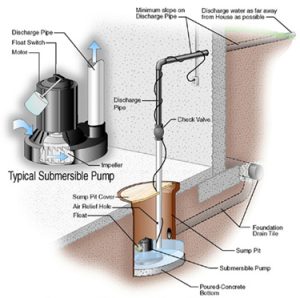Getting to Know Your Public Sewer System
What it Does
The public Sanitary Sewer System is designed to provide the vital link between your residence and the central sewage treatment plant (the City of Bethlehem facility along Shimersville Road), where the wastewater is treated to make it environmentally safe before being returned to the Lehigh River. It provides a valuable public health service to our community.
How it Works
Your home’s sewer lines are connected to the public sewer system via a connection to a larger main, often in the street. Those mains form a network that interconnects various neighborhoods and moves the collected wastewater along to the treatment facility. In most areas the flow is conveyed by gravity, through gently sloping mains, to the wastewater treatment plant. In some cases the flow is pumped from a low collection point and back up into the gravity system to overcome hills, etc.
A Sewer’s a Sewer…..Isn’t It?
Actually, there are two different types.
The Authority operates and maintains a Sanitary Sewer System to convey wastewater which is sealed, to the degree possible, to prevent rainwater (sometimes referred to as “storm water”) from getting into the system.
This is because wastewater is ultimately transported to a sewage treatment facility for extensive processing before being returned to the environment. We want to avoid getting rainwater into this system because:
- It costs money to treat…(why pay to treat rainwater?)
- The excessive flows during a major storm can create serious operational problems for the plant and the collection system.
Storm sewers are separate, and are meant to help control / convey storm water runoff into nearby detention / retention basins, creeks or streams to minimize flooding. They are often characterized by large, open cast iron grates, etc., to collect surface runoff and are often located at the edge of a road.
It is important to note that the Sanitary Sewer System manholes and their familiar round cast iron lids (marked “Sanitary Sewer”) are actually sealed to prevent rain / storm water from getting into the system. The Authority discourages contractors and others from opening these manholes because we want to avoid damaging these seals.
How Can I Help Keep the Sanitary Sewer System Operating Properly?
Customers can play a major role in keeping treatment costs and operational problems at a minimum by following a few simple guidelines:
- Make sure rainwater, downspouts, basement drains and sump pump discharges are not connected or piped into the sanitary sewer. See article on Sump Pumps from the Township’s Fall 2005 Newsletter which follows this section.
- Make sure that the sewer vent and cleanouts in your yard do not allow rainwater, etc. to flow into the sewer when the yard floods. If this is a problem, raising the vent line a few inches or repairing or replacing the vent cap can easily solve the problem.
- Never put grease or oil, eggshells, coffee grounds, etc. down the drain. Similarly, avoid flushing disposable diapers or feminine hygiene products into the system. These items can build up in and clog your house piping and possibly the main in the street as well, creating major problems.
- Never put flammable materials (gasoline, solvents, etc.) into the system as these can cause dangerous buildups of explosive vapors which can create a public safety hazard to others and persons working on the system.
With a little help from its friends, your house piping and the public Sanitary Sewer System should provide many years of reliable, trouble-free service.
Note: a Brochure entitled “Public Sewer System Information” was sent out to Customers in January 2007. It covers the key issues discussed in this section. Extra copies are available at the Authority Office and the Township Municipal Building.
Your Friends at The Lower Saucon Authority
Sump Pumps – PLEASE Do Not Connect to Sanitary Sewers
 If you have a sump pump in your basement, as shown below (in a sketch from the State Farm website), you need to make sure than it is discharging outside into the lawn and not into the public sanitary sewer (i.e. the ones connected to your household plumbing, toilet, etc.).
If you have a sump pump in your basement, as shown below (in a sketch from the State Farm website), you need to make sure than it is discharging outside into the lawn and not into the public sanitary sewer (i.e. the ones connected to your household plumbing, toilet, etc.).
This is extremely important as all users collectively pay for treatment of all flows that go through the Sewage Treatment Plant. In addition to burdening the public system economically, excessive and unnecessary flows can cause problems in the collection system and plant operation which can lead to serious overloading of those facilities during a major storm event.
We make every effort to make sure the mains, manholes, etc. are as water tight as possible to avoid this problem. Manholes and mains, as they are constructed, are actually pressure/vacuum-tested to assure leak tightness. You can do your part by checking your sump pump discharge and making sure it discharges into the yard and is not connected to your sewer piping.
Thank you.
